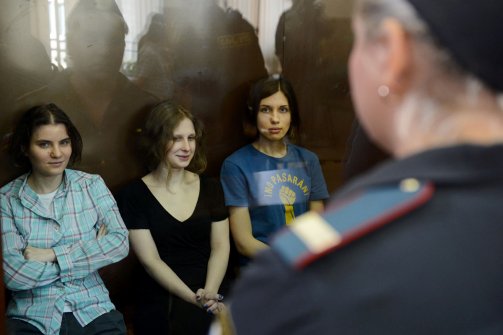
The jailed members of Pussy Riot will face an appeals court on October 1st. Photo: Natalia Kolesnikova/AFP/Getty Images.
by Irina Papkova
Just when you thought that the world had forgotten about Pussy Riot, the Russian punk band is once again making world news headlines as three of its members prepare to face an appeals court in Moscow on October 1st. For those few who may need a reminder, Nadezhda Tolokonnikova, Maria Alekhina and Ekaterina Samusevitch were convicted on August 17 of hooliganism motivated by enmity towards religion. Their alleged crime consisted of climbing onto the ambo (roughly, the steps leading up to the pulpit) of Russia’s largest cathedral and attempting to sing a “prayer” to the Virgin Mary, asking her to rid Russia of Putin. The various nuances of both their action and the trial that followed have been discussed in detail elsewhere. I’d like to merely highlight two aspects of the story that are important in the broader international context, and that are less considered by the Western media.
First, the Pussy Riot story should be placed in the context of the phenomenon that sociologists have identified as the “desecularization” of the world. For more decades, sociologists such as Peter Berger, Jose Casanova and others have written about a global resurgence of religion, which contradicted the earlier sociological consensus that the world, as it modernized, would become “more secular.” Yet as we’ve seen, religion did not simply fade away, and religious organizations and people of faith are actively seeking the right to express social and political convictions that are openly motivated by religious concerns. Debates as to whether or not they should be able to do so have been contentious. Characteristically, the philosopher Jurgen Habermas has written that of course, religious citizens should be able to participate equally in the global public sphere, as long as they “translate” their religious ideas into secular language. This, of course, means that religious ideas can be brought into the public sphere on the condition that they lose their religious specificity. Not surprisingly, the formula has not worked, as religious populations around the world have continued to move openly and boldly into the political realm – from the Middle East to the United States, and increasingly in Europe, religion has re-entered politics in a way that has not been seen since the beginning of the twentieth century. The confrontation between Pussy Riot and certain (not all!) members of the Russian Orthodox Church should be seen in this context: Russia, for all of its peculiarities, is not unique when it comes to existing tensions between religion(s) and the public or civic realm.
Second, there is an eerie similarity between the reaction of some Orthodox believers to the Pussy Riot episode and the worldwide protests against the amateur anti-Islamic film “Innocence of Muslims.” Certainly, the Russian Orthodox were not out demonstrating in the tens of thousands; nor have Orthodox clergy called for the physical elimination of Pussy Riot. At the same time, both the Orthodox Church in Russia and many Muslim clerics this week have been calling for laws banning “insults to religion.” In the Islamic case, the focus has been on appealing to the United Nations meeting in New York this week for such a law on the international level; in Russia, prominent Russian Orthodox clergy have called for legislation banning insult to religion within the Russian Federation, and indeed a proposal to that effect is currently circulating in the Duma (Russian, English). And in Lebanon, this week, a joint conference of Lebanese Islamic and Christian clerics has issued just such a demand, also to the U.N., showing that what may initially be thought of as unrelated phenomena is actually a growing global movement across religious communities, with some arguing that protection against “religious hatred” should rise to the level of a newly defined human right. The implications of this are of course fascinating, and critical to explore further (see Austin Dacey’s take on this for The Revealer for a start).
Irina Papkova is a Research Fellow at Georgetown University’s Berkeley Center For Religion, Peace and World Affairs. She received her Ph.D. from Georgetown University and has previously taught at Georgetown and George Washington Universities. Her book, “The Orthodox Church and Russian Politics,” was published by Oxford University Press and Woodrow Wilson Center Press in 2011. Irina’s current research includes Lebanese politics and the Secular Lebanon movement. She is a regular contributor to The Revealer.
With support from the Henry R. Luce Initiative on Religion and International Affairs.
